Report on International Management: Expatriate Success and Ethics
VerifiedAdded on 2023/01/06
|10
|2395
|55
Report
AI Summary
This report delves into the critical aspects of international management, beginning with an examination of expatriate failure and success. It defines expatriates, explores failure rates, and analyzes reasons for both expatriate failure, such as lack of cross-cultural adjustment, and success, including adaptability and family situation. The report also discusses expatriate selection processes and the importance of company training. Furthermore, the report addresses ethical considerations in international business, defining ethics, and exploring stakeholder theory, accountability, and international law. It differentiates between ethics and law, and examines corporate social responsibility and human rights within the global context. The report provides a comprehensive overview of key concepts and challenges in managing international operations ethically and effectively.
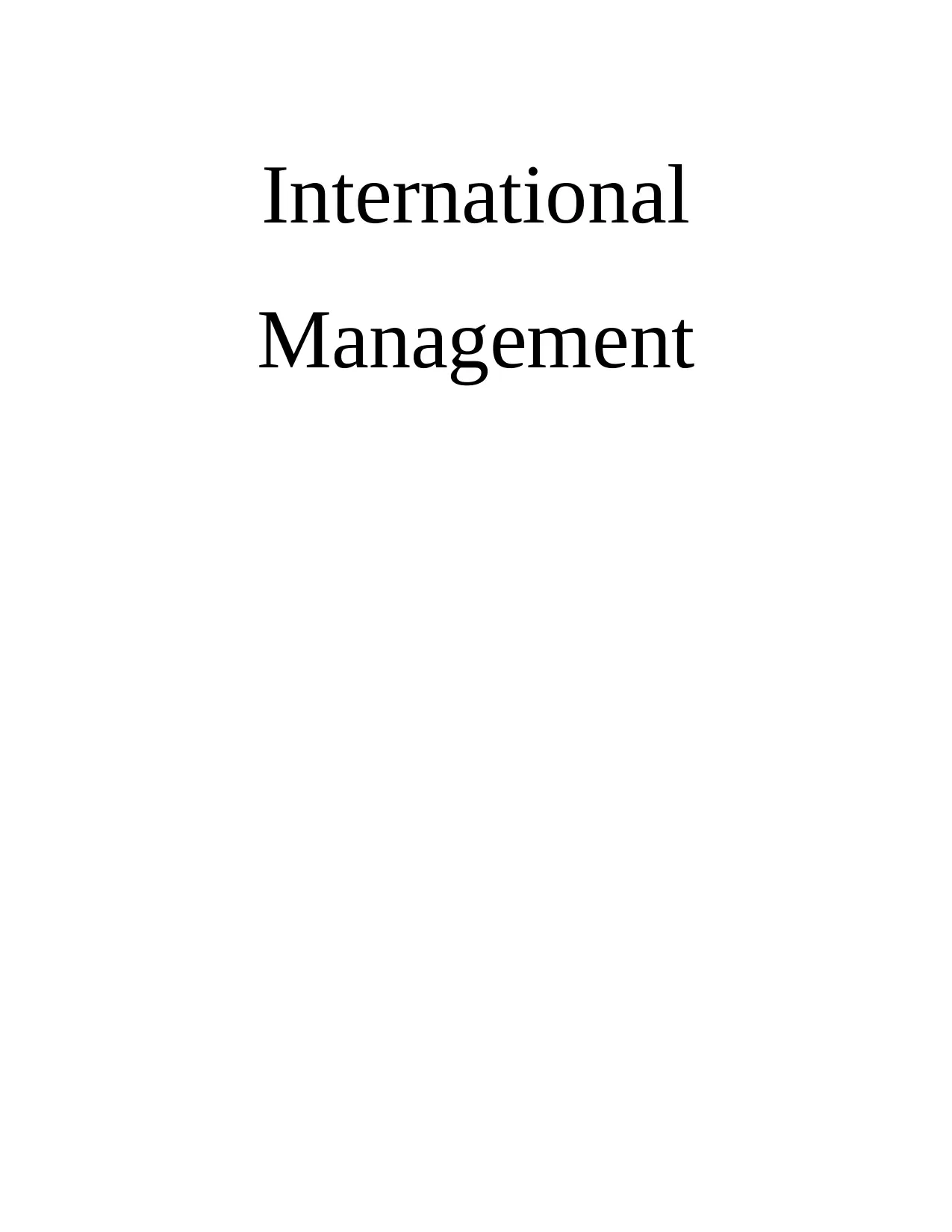
International
Management
Management
Paraphrase This Document
Need a fresh take? Get an instant paraphrase of this document with our AI Paraphraser

Table of Contents
QUESTION 1..................................................................................................................................3
QUESTION 2..................................................................................................................................3
REFERENCES................................................................................................................................6
QUESTION 1..................................................................................................................................3
QUESTION 2..................................................................................................................................3
REFERENCES................................................................................................................................6
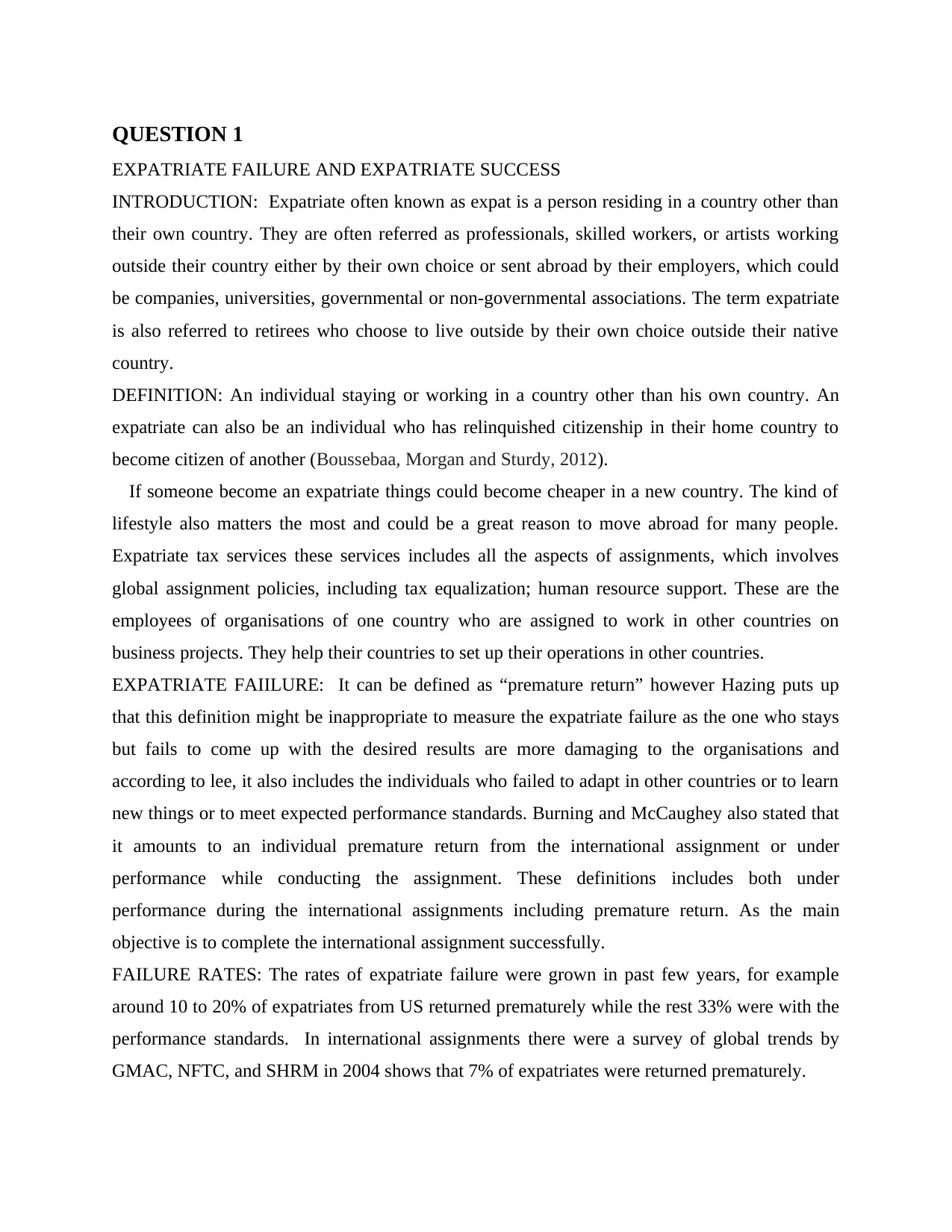
QUESTION 1
EXPATRIATE FAILURE AND EXPATRIATE SUCCESS
INTRODUCTION: Expatriate often known as expat is a person residing in a country other than
their own country. They are often referred as professionals, skilled workers, or artists working
outside their country either by their own choice or sent abroad by their employers, which could
be companies, universities, governmental or non-governmental associations. The term expatriate
is also referred to retirees who choose to live outside by their own choice outside their native
country.
DEFINITION: An individual staying or working in a country other than his own country. An
expatriate can also be an individual who has relinquished citizenship in their home country to
become citizen of another (Boussebaa, Morgan and Sturdy, 2012).
If someone become an expatriate things could become cheaper in a new country. The kind of
lifestyle also matters the most and could be a great reason to move abroad for many people.
Expatriate tax services these services includes all the aspects of assignments, which involves
global assignment policies, including tax equalization; human resource support. These are the
employees of organisations of one country who are assigned to work in other countries on
business projects. They help their countries to set up their operations in other countries.
EXPATRIATE FAIILURE: It can be defined as “premature return” however Hazing puts up
that this definition might be inappropriate to measure the expatriate failure as the one who stays
but fails to come up with the desired results are more damaging to the organisations and
according to lee, it also includes the individuals who failed to adapt in other countries or to learn
new things or to meet expected performance standards. Burning and McCaughey also stated that
it amounts to an individual premature return from the international assignment or under
performance while conducting the assignment. These definitions includes both under
performance during the international assignments including premature return. As the main
objective is to complete the international assignment successfully.
FAILURE RATES: The rates of expatriate failure were grown in past few years, for example
around 10 to 20% of expatriates from US returned prematurely while the rest 33% were with the
performance standards. In international assignments there were a survey of global trends by
GMAC, NFTC, and SHRM in 2004 shows that 7% of expatriates were returned prematurely.
EXPATRIATE FAILURE AND EXPATRIATE SUCCESS
INTRODUCTION: Expatriate often known as expat is a person residing in a country other than
their own country. They are often referred as professionals, skilled workers, or artists working
outside their country either by their own choice or sent abroad by their employers, which could
be companies, universities, governmental or non-governmental associations. The term expatriate
is also referred to retirees who choose to live outside by their own choice outside their native
country.
DEFINITION: An individual staying or working in a country other than his own country. An
expatriate can also be an individual who has relinquished citizenship in their home country to
become citizen of another (Boussebaa, Morgan and Sturdy, 2012).
If someone become an expatriate things could become cheaper in a new country. The kind of
lifestyle also matters the most and could be a great reason to move abroad for many people.
Expatriate tax services these services includes all the aspects of assignments, which involves
global assignment policies, including tax equalization; human resource support. These are the
employees of organisations of one country who are assigned to work in other countries on
business projects. They help their countries to set up their operations in other countries.
EXPATRIATE FAIILURE: It can be defined as “premature return” however Hazing puts up
that this definition might be inappropriate to measure the expatriate failure as the one who stays
but fails to come up with the desired results are more damaging to the organisations and
according to lee, it also includes the individuals who failed to adapt in other countries or to learn
new things or to meet expected performance standards. Burning and McCaughey also stated that
it amounts to an individual premature return from the international assignment or under
performance while conducting the assignment. These definitions includes both under
performance during the international assignments including premature return. As the main
objective is to complete the international assignment successfully.
FAILURE RATES: The rates of expatriate failure were grown in past few years, for example
around 10 to 20% of expatriates from US returned prematurely while the rest 33% were with the
performance standards. In international assignments there were a survey of global trends by
GMAC, NFTC, and SHRM in 2004 shows that 7% of expatriates were returned prematurely.
⊘ This is a preview!⊘
Do you want full access?
Subscribe today to unlock all pages.

Trusted by 1+ million students worldwide
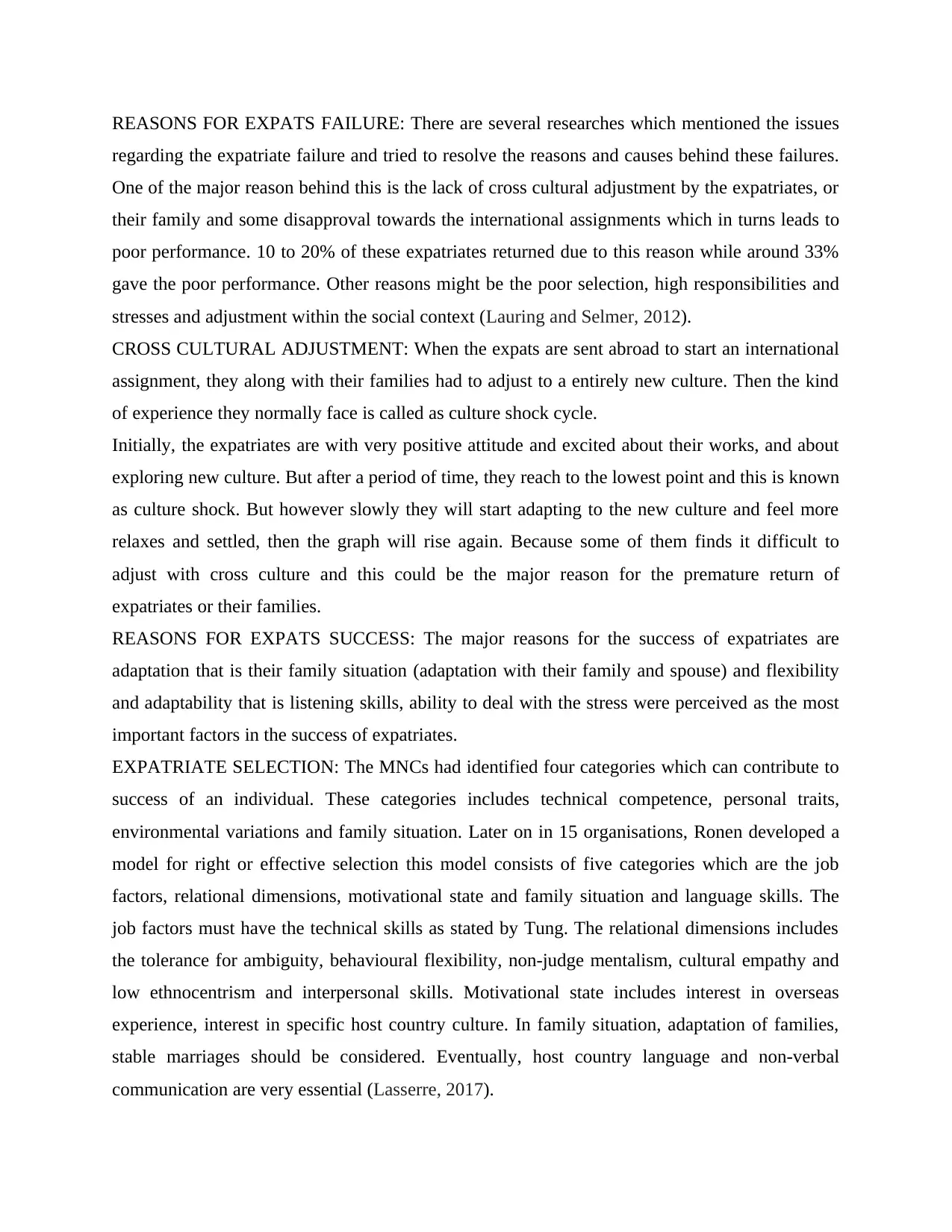
REASONS FOR EXPATS FAILURE: There are several researches which mentioned the issues
regarding the expatriate failure and tried to resolve the reasons and causes behind these failures.
One of the major reason behind this is the lack of cross cultural adjustment by the expatriates, or
their family and some disapproval towards the international assignments which in turns leads to
poor performance. 10 to 20% of these expatriates returned due to this reason while around 33%
gave the poor performance. Other reasons might be the poor selection, high responsibilities and
stresses and adjustment within the social context (Lauring and Selmer, 2012).
CROSS CULTURAL ADJUSTMENT: When the expats are sent abroad to start an international
assignment, they along with their families had to adjust to a entirely new culture. Then the kind
of experience they normally face is called as culture shock cycle.
Initially, the expatriates are with very positive attitude and excited about their works, and about
exploring new culture. But after a period of time, they reach to the lowest point and this is known
as culture shock. But however slowly they will start adapting to the new culture and feel more
relaxes and settled, then the graph will rise again. Because some of them finds it difficult to
adjust with cross culture and this could be the major reason for the premature return of
expatriates or their families.
REASONS FOR EXPATS SUCCESS: The major reasons for the success of expatriates are
adaptation that is their family situation (adaptation with their family and spouse) and flexibility
and adaptability that is listening skills, ability to deal with the stress were perceived as the most
important factors in the success of expatriates.
EXPATRIATE SELECTION: The MNCs had identified four categories which can contribute to
success of an individual. These categories includes technical competence, personal traits,
environmental variations and family situation. Later on in 15 organisations, Ronen developed a
model for right or effective selection this model consists of five categories which are the job
factors, relational dimensions, motivational state and family situation and language skills. The
job factors must have the technical skills as stated by Tung. The relational dimensions includes
the tolerance for ambiguity, behavioural flexibility, non-judge mentalism, cultural empathy and
low ethnocentrism and interpersonal skills. Motivational state includes interest in overseas
experience, interest in specific host country culture. In family situation, adaptation of families,
stable marriages should be considered. Eventually, host country language and non-verbal
communication are very essential (Lasserre, 2017).
regarding the expatriate failure and tried to resolve the reasons and causes behind these failures.
One of the major reason behind this is the lack of cross cultural adjustment by the expatriates, or
their family and some disapproval towards the international assignments which in turns leads to
poor performance. 10 to 20% of these expatriates returned due to this reason while around 33%
gave the poor performance. Other reasons might be the poor selection, high responsibilities and
stresses and adjustment within the social context (Lauring and Selmer, 2012).
CROSS CULTURAL ADJUSTMENT: When the expats are sent abroad to start an international
assignment, they along with their families had to adjust to a entirely new culture. Then the kind
of experience they normally face is called as culture shock cycle.
Initially, the expatriates are with very positive attitude and excited about their works, and about
exploring new culture. But after a period of time, they reach to the lowest point and this is known
as culture shock. But however slowly they will start adapting to the new culture and feel more
relaxes and settled, then the graph will rise again. Because some of them finds it difficult to
adjust with cross culture and this could be the major reason for the premature return of
expatriates or their families.
REASONS FOR EXPATS SUCCESS: The major reasons for the success of expatriates are
adaptation that is their family situation (adaptation with their family and spouse) and flexibility
and adaptability that is listening skills, ability to deal with the stress were perceived as the most
important factors in the success of expatriates.
EXPATRIATE SELECTION: The MNCs had identified four categories which can contribute to
success of an individual. These categories includes technical competence, personal traits,
environmental variations and family situation. Later on in 15 organisations, Ronen developed a
model for right or effective selection this model consists of five categories which are the job
factors, relational dimensions, motivational state and family situation and language skills. The
job factors must have the technical skills as stated by Tung. The relational dimensions includes
the tolerance for ambiguity, behavioural flexibility, non-judge mentalism, cultural empathy and
low ethnocentrism and interpersonal skills. Motivational state includes interest in overseas
experience, interest in specific host country culture. In family situation, adaptation of families,
stable marriages should be considered. Eventually, host country language and non-verbal
communication are very essential (Lasserre, 2017).
Paraphrase This Document
Need a fresh take? Get an instant paraphrase of this document with our AI Paraphraser
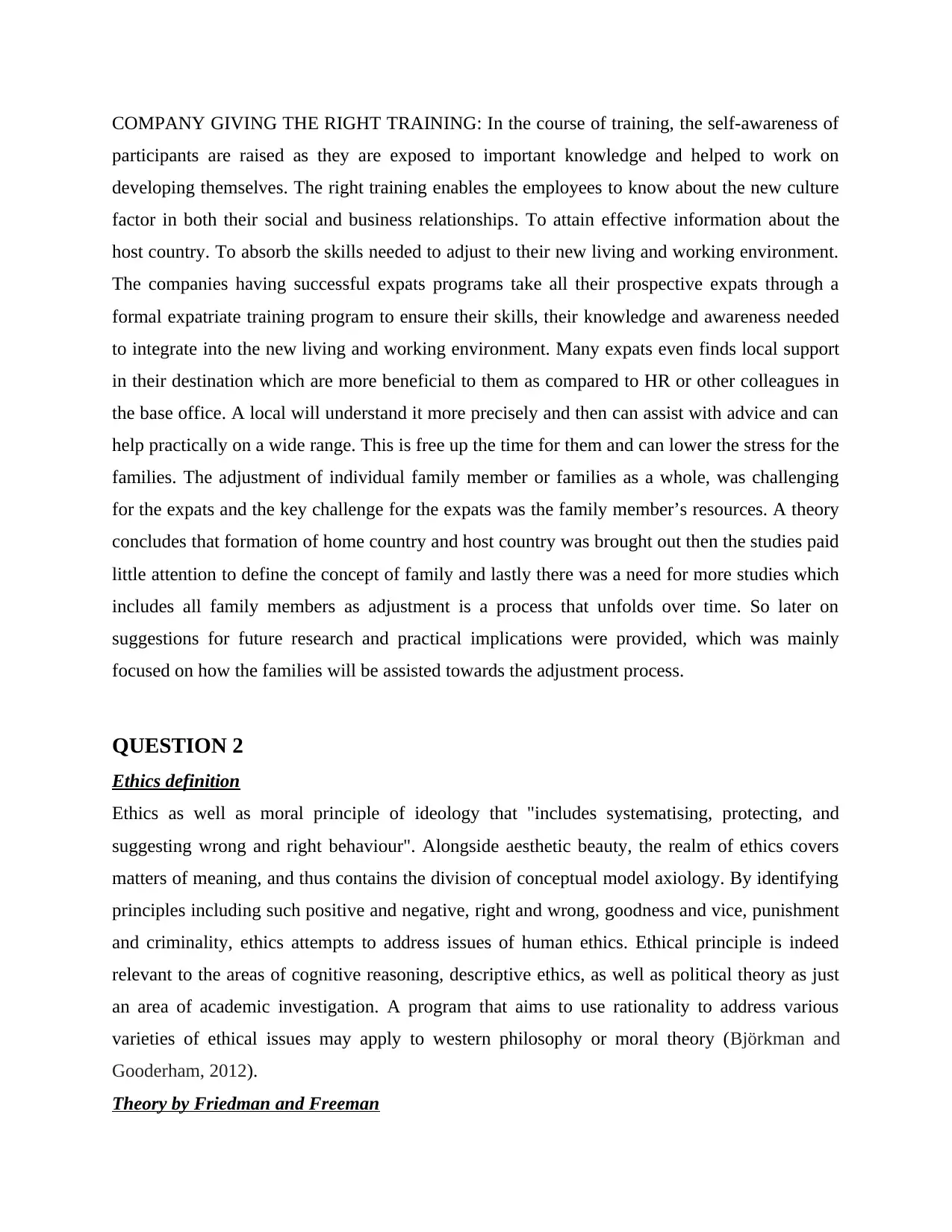
COMPANY GIVING THE RIGHT TRAINING: In the course of training, the self-awareness of
participants are raised as they are exposed to important knowledge and helped to work on
developing themselves. The right training enables the employees to know about the new culture
factor in both their social and business relationships. To attain effective information about the
host country. To absorb the skills needed to adjust to their new living and working environment.
The companies having successful expats programs take all their prospective expats through a
formal expatriate training program to ensure their skills, their knowledge and awareness needed
to integrate into the new living and working environment. Many expats even finds local support
in their destination which are more beneficial to them as compared to HR or other colleagues in
the base office. A local will understand it more precisely and then can assist with advice and can
help practically on a wide range. This is free up the time for them and can lower the stress for the
families. The adjustment of individual family member or families as a whole, was challenging
for the expats and the key challenge for the expats was the family member’s resources. A theory
concludes that formation of home country and host country was brought out then the studies paid
little attention to define the concept of family and lastly there was a need for more studies which
includes all family members as adjustment is a process that unfolds over time. So later on
suggestions for future research and practical implications were provided, which was mainly
focused on how the families will be assisted towards the adjustment process.
QUESTION 2
Ethics definition
Ethics as well as moral principle of ideology that "includes systematising, protecting, and
suggesting wrong and right behaviour". Alongside aesthetic beauty, the realm of ethics covers
matters of meaning, and thus contains the division of conceptual model axiology. By identifying
principles including such positive and negative, right and wrong, goodness and vice, punishment
and criminality, ethics attempts to address issues of human ethics. Ethical principle is indeed
relevant to the areas of cognitive reasoning, descriptive ethics, as well as political theory as just
an area of academic investigation. A program that aims to use rationality to address various
varieties of ethical issues may apply to western philosophy or moral theory (Björkman and
Gooderham, 2012).
Theory by Friedman and Freeman
participants are raised as they are exposed to important knowledge and helped to work on
developing themselves. The right training enables the employees to know about the new culture
factor in both their social and business relationships. To attain effective information about the
host country. To absorb the skills needed to adjust to their new living and working environment.
The companies having successful expats programs take all their prospective expats through a
formal expatriate training program to ensure their skills, their knowledge and awareness needed
to integrate into the new living and working environment. Many expats even finds local support
in their destination which are more beneficial to them as compared to HR or other colleagues in
the base office. A local will understand it more precisely and then can assist with advice and can
help practically on a wide range. This is free up the time for them and can lower the stress for the
families. The adjustment of individual family member or families as a whole, was challenging
for the expats and the key challenge for the expats was the family member’s resources. A theory
concludes that formation of home country and host country was brought out then the studies paid
little attention to define the concept of family and lastly there was a need for more studies which
includes all family members as adjustment is a process that unfolds over time. So later on
suggestions for future research and practical implications were provided, which was mainly
focused on how the families will be assisted towards the adjustment process.
QUESTION 2
Ethics definition
Ethics as well as moral principle of ideology that "includes systematising, protecting, and
suggesting wrong and right behaviour". Alongside aesthetic beauty, the realm of ethics covers
matters of meaning, and thus contains the division of conceptual model axiology. By identifying
principles including such positive and negative, right and wrong, goodness and vice, punishment
and criminality, ethics attempts to address issues of human ethics. Ethical principle is indeed
relevant to the areas of cognitive reasoning, descriptive ethics, as well as political theory as just
an area of academic investigation. A program that aims to use rationality to address various
varieties of ethical issues may apply to western philosophy or moral theory (Björkman and
Gooderham, 2012).
Theory by Friedman and Freeman
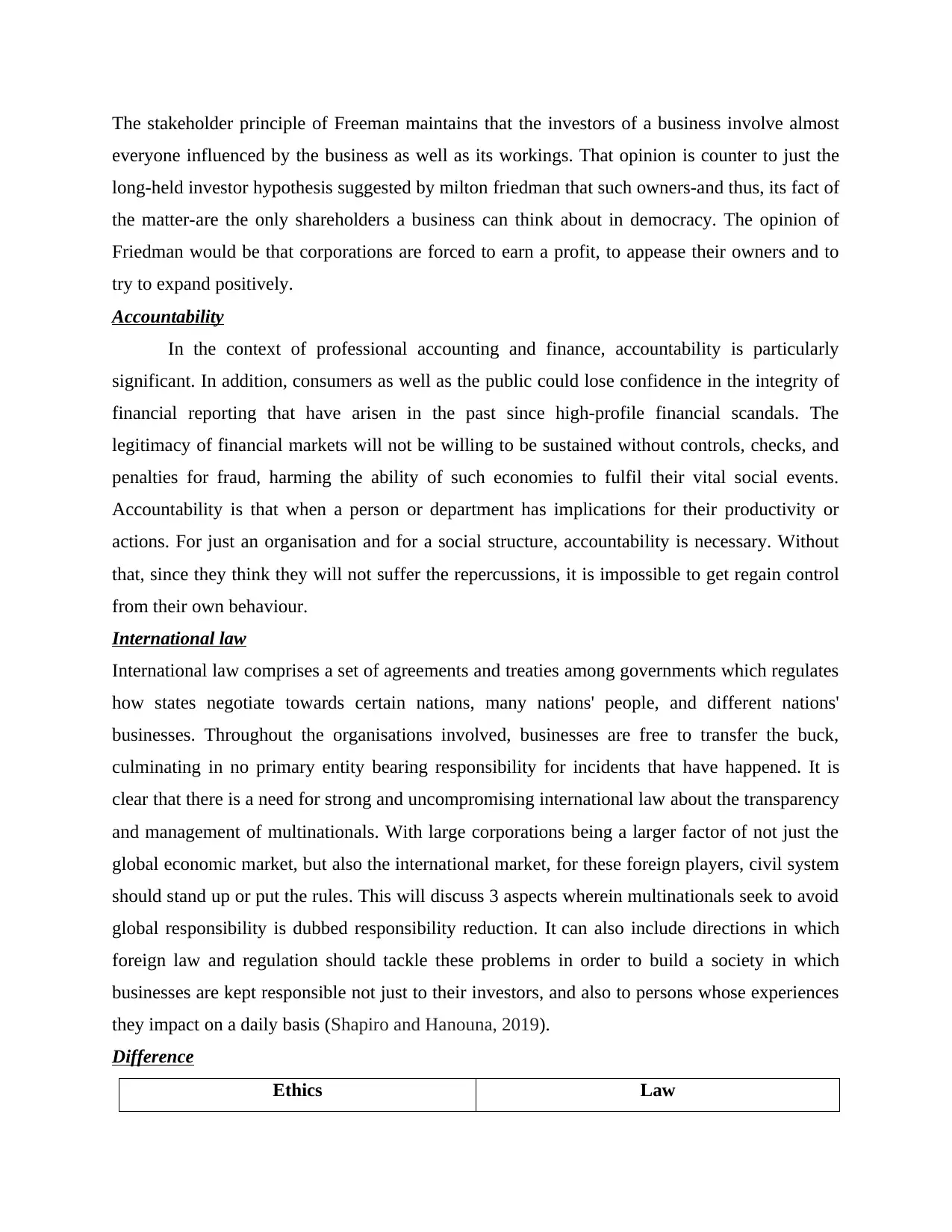
The stakeholder principle of Freeman maintains that the investors of a business involve almost
everyone influenced by the business as well as its workings. That opinion is counter to just the
long-held investor hypothesis suggested by milton friedman that such owners-and thus, its fact of
the matter-are the only shareholders a business can think about in democracy. The opinion of
Friedman would be that corporations are forced to earn a profit, to appease their owners and to
try to expand positively.
Accountability
In the context of professional accounting and finance, accountability is particularly
significant. In addition, consumers as well as the public could lose confidence in the integrity of
financial reporting that have arisen in the past since high-profile financial scandals. The
legitimacy of financial markets will not be willing to be sustained without controls, checks, and
penalties for fraud, harming the ability of such economies to fulfil their vital social events.
Accountability is that when a person or department has implications for their productivity or
actions. For just an organisation and for a social structure, accountability is necessary. Without
that, since they think they will not suffer the repercussions, it is impossible to get regain control
from their own behaviour.
International law
International law comprises a set of agreements and treaties among governments which regulates
how states negotiate towards certain nations, many nations' people, and different nations'
businesses. Throughout the organisations involved, businesses are free to transfer the buck,
culminating in no primary entity bearing responsibility for incidents that have happened. It is
clear that there is a need for strong and uncompromising international law about the transparency
and management of multinationals. With large corporations being a larger factor of not just the
global economic market, but also the international market, for these foreign players, civil system
should stand up or put the rules. This will discuss 3 aspects wherein multinationals seek to avoid
global responsibility is dubbed responsibility reduction. It can also include directions in which
foreign law and regulation should tackle these problems in order to build a society in which
businesses are kept responsible not just to their investors, and also to persons whose experiences
they impact on a daily basis (Shapiro and Hanouna, 2019).
Difference
Ethics Law
everyone influenced by the business as well as its workings. That opinion is counter to just the
long-held investor hypothesis suggested by milton friedman that such owners-and thus, its fact of
the matter-are the only shareholders a business can think about in democracy. The opinion of
Friedman would be that corporations are forced to earn a profit, to appease their owners and to
try to expand positively.
Accountability
In the context of professional accounting and finance, accountability is particularly
significant. In addition, consumers as well as the public could lose confidence in the integrity of
financial reporting that have arisen in the past since high-profile financial scandals. The
legitimacy of financial markets will not be willing to be sustained without controls, checks, and
penalties for fraud, harming the ability of such economies to fulfil their vital social events.
Accountability is that when a person or department has implications for their productivity or
actions. For just an organisation and for a social structure, accountability is necessary. Without
that, since they think they will not suffer the repercussions, it is impossible to get regain control
from their own behaviour.
International law
International law comprises a set of agreements and treaties among governments which regulates
how states negotiate towards certain nations, many nations' people, and different nations'
businesses. Throughout the organisations involved, businesses are free to transfer the buck,
culminating in no primary entity bearing responsibility for incidents that have happened. It is
clear that there is a need for strong and uncompromising international law about the transparency
and management of multinationals. With large corporations being a larger factor of not just the
global economic market, but also the international market, for these foreign players, civil system
should stand up or put the rules. This will discuss 3 aspects wherein multinationals seek to avoid
global responsibility is dubbed responsibility reduction. It can also include directions in which
foreign law and regulation should tackle these problems in order to build a society in which
businesses are kept responsible not just to their investors, and also to persons whose experiences
they impact on a daily basis (Shapiro and Hanouna, 2019).
Difference
Ethics Law
⊘ This is a preview!⊘
Do you want full access?
Subscribe today to unlock all pages.

Trusted by 1+ million students worldwide
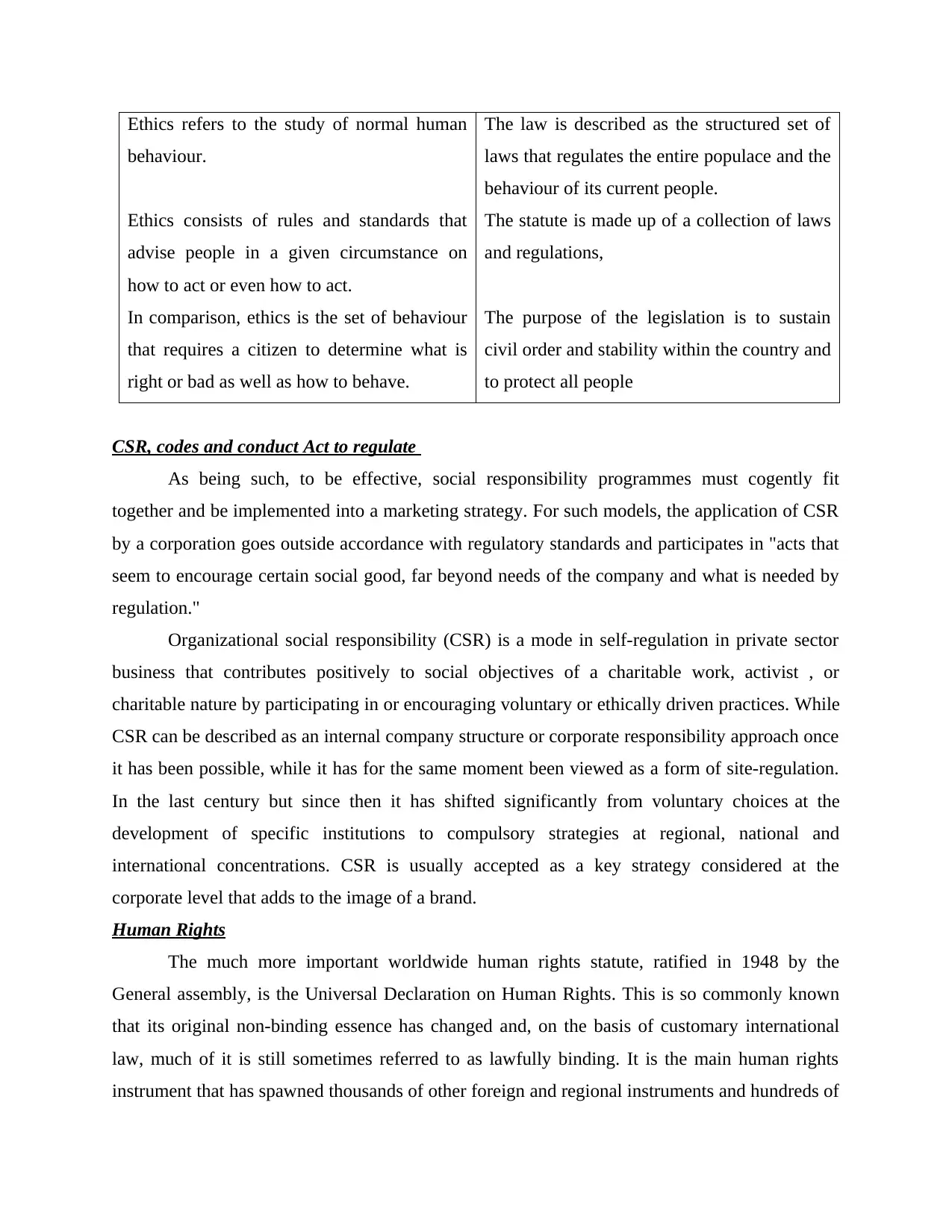
Ethics refers to the study of normal human
behaviour.
Ethics consists of rules and standards that
advise people in a given circumstance on
how to act or even how to act.
In comparison, ethics is the set of behaviour
that requires a citizen to determine what is
right or bad as well as how to behave.
The law is described as the structured set of
laws that regulates the entire populace and the
behaviour of its current people.
The statute is made up of a collection of laws
and regulations,
The purpose of the legislation is to sustain
civil order and stability within the country and
to protect all people
CSR, codes and conduct Act to regulate
As being such, to be effective, social responsibility programmes must cogently fit
together and be implemented into a marketing strategy. For such models, the application of CSR
by a corporation goes outside accordance with regulatory standards and participates in "acts that
seem to encourage certain social good, far beyond needs of the company and what is needed by
regulation."
Organizational social responsibility (CSR) is a mode in self-regulation in private sector
business that contributes positively to social objectives of a charitable work, activist , or
charitable nature by participating in or encouraging voluntary or ethically driven practices. While
CSR can be described as an internal company structure or corporate responsibility approach once
it has been possible, while it has for the same moment been viewed as a form of site-regulation.
In the last century but since then it has shifted significantly from voluntary choices at the
development of specific institutions to compulsory strategies at regional, national and
international concentrations. CSR is usually accepted as a key strategy considered at the
corporate level that adds to the image of a brand.
Human Rights
The much more important worldwide human rights statute, ratified in 1948 by the
General assembly, is the Universal Declaration on Human Rights. This is so commonly known
that its original non-binding essence has changed and, on the basis of customary international
law, much of it is still sometimes referred to as lawfully binding. It is the main human rights
instrument that has spawned thousands of other foreign and regional instruments and hundreds of
behaviour.
Ethics consists of rules and standards that
advise people in a given circumstance on
how to act or even how to act.
In comparison, ethics is the set of behaviour
that requires a citizen to determine what is
right or bad as well as how to behave.
The law is described as the structured set of
laws that regulates the entire populace and the
behaviour of its current people.
The statute is made up of a collection of laws
and regulations,
The purpose of the legislation is to sustain
civil order and stability within the country and
to protect all people
CSR, codes and conduct Act to regulate
As being such, to be effective, social responsibility programmes must cogently fit
together and be implemented into a marketing strategy. For such models, the application of CSR
by a corporation goes outside accordance with regulatory standards and participates in "acts that
seem to encourage certain social good, far beyond needs of the company and what is needed by
regulation."
Organizational social responsibility (CSR) is a mode in self-regulation in private sector
business that contributes positively to social objectives of a charitable work, activist , or
charitable nature by participating in or encouraging voluntary or ethically driven practices. While
CSR can be described as an internal company structure or corporate responsibility approach once
it has been possible, while it has for the same moment been viewed as a form of site-regulation.
In the last century but since then it has shifted significantly from voluntary choices at the
development of specific institutions to compulsory strategies at regional, national and
international concentrations. CSR is usually accepted as a key strategy considered at the
corporate level that adds to the image of a brand.
Human Rights
The much more important worldwide human rights statute, ratified in 1948 by the
General assembly, is the Universal Declaration on Human Rights. This is so commonly known
that its original non-binding essence has changed and, on the basis of customary international
law, much of it is still sometimes referred to as lawfully binding. It is the main human rights
instrument that has spawned thousands of other foreign and regional instruments and hundreds of
Paraphrase This Document
Need a fresh take? Get an instant paraphrase of this document with our AI Paraphraser
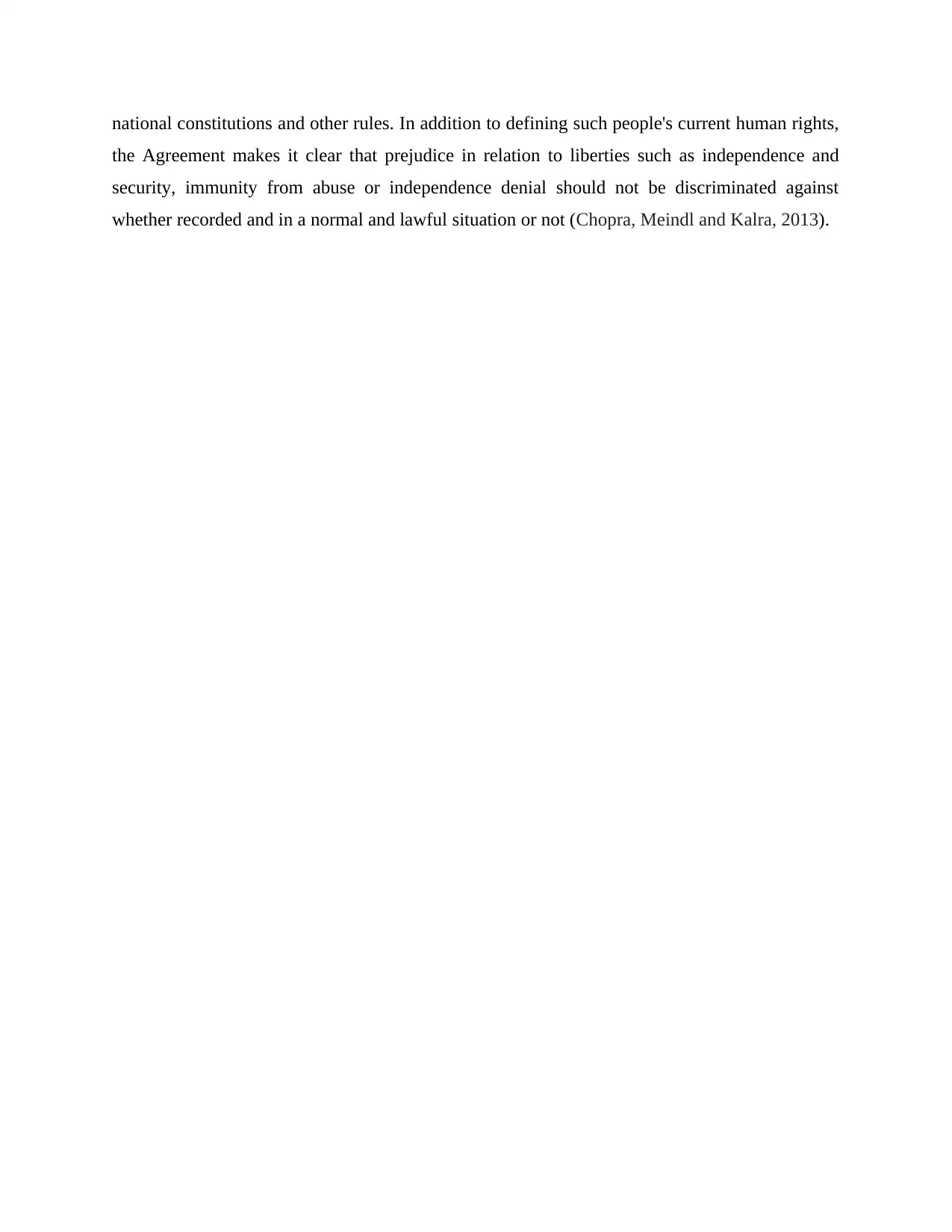
national constitutions and other rules. In addition to defining such people's current human rights,
the Agreement makes it clear that prejudice in relation to liberties such as independence and
security, immunity from abuse or independence denial should not be discriminated against
whether recorded and in a normal and lawful situation or not (Chopra, Meindl and Kalra, 2013).
the Agreement makes it clear that prejudice in relation to liberties such as independence and
security, immunity from abuse or independence denial should not be discriminated against
whether recorded and in a normal and lawful situation or not (Chopra, Meindl and Kalra, 2013).
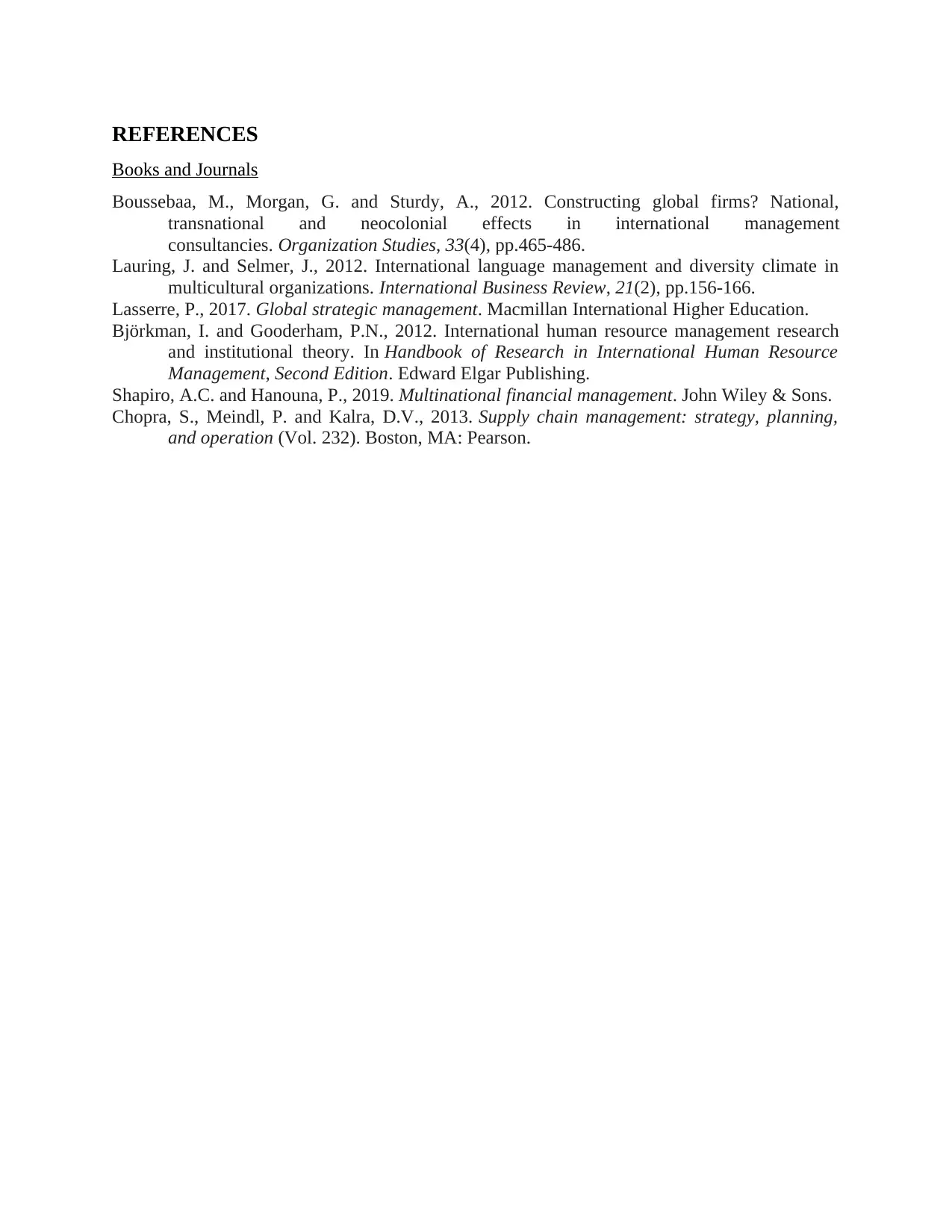
REFERENCES
Books and Journals
Boussebaa, M., Morgan, G. and Sturdy, A., 2012. Constructing global firms? National,
transnational and neocolonial effects in international management
consultancies. Organization Studies, 33(4), pp.465-486.
Lauring, J. and Selmer, J., 2012. International language management and diversity climate in
multicultural organizations. International Business Review, 21(2), pp.156-166.
Lasserre, P., 2017. Global strategic management. Macmillan International Higher Education.
Björkman, I. and Gooderham, P.N., 2012. International human resource management research
and institutional theory. In Handbook of Research in International Human Resource
Management, Second Edition. Edward Elgar Publishing.
Shapiro, A.C. and Hanouna, P., 2019. Multinational financial management. John Wiley & Sons.
Chopra, S., Meindl, P. and Kalra, D.V., 2013. Supply chain management: strategy, planning,
and operation (Vol. 232). Boston, MA: Pearson.
Books and Journals
Boussebaa, M., Morgan, G. and Sturdy, A., 2012. Constructing global firms? National,
transnational and neocolonial effects in international management
consultancies. Organization Studies, 33(4), pp.465-486.
Lauring, J. and Selmer, J., 2012. International language management and diversity climate in
multicultural organizations. International Business Review, 21(2), pp.156-166.
Lasserre, P., 2017. Global strategic management. Macmillan International Higher Education.
Björkman, I. and Gooderham, P.N., 2012. International human resource management research
and institutional theory. In Handbook of Research in International Human Resource
Management, Second Edition. Edward Elgar Publishing.
Shapiro, A.C. and Hanouna, P., 2019. Multinational financial management. John Wiley & Sons.
Chopra, S., Meindl, P. and Kalra, D.V., 2013. Supply chain management: strategy, planning,
and operation (Vol. 232). Boston, MA: Pearson.
⊘ This is a preview!⊘
Do you want full access?
Subscribe today to unlock all pages.

Trusted by 1+ million students worldwide

1 out of 10
Related Documents
Your All-in-One AI-Powered Toolkit for Academic Success.
+13062052269
info@desklib.com
Available 24*7 on WhatsApp / Email
![[object Object]](/_next/static/media/star-bottom.7253800d.svg)
Unlock your academic potential
Copyright © 2020–2026 A2Z Services. All Rights Reserved. Developed and managed by ZUCOL.





